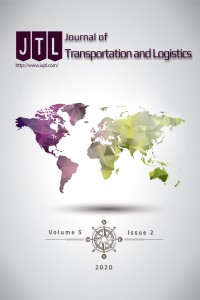Abstract
Nowadays, transportation has reached dimensions that have never been seen before, the amount of cargoes has diversified with quantity increases with the development of industry. Low cost, the number of goods transported, and security are the most important factors in the transportation sector. Due to these reasons, the majority of cargo transport in the world is carried out by seaway. In addition, the high increases in the costs of diesel fuel in ship transportation lead shipowners to use different fuels. Alternative fuels have started to be used on new ships and certain old ships. In this study in a one-year period, the costs and carbon dioxide emission values of alternative fuels that can be used in ships were calculated in different operating conditions. The ship used in this study has a diesel engine with a power of 5975 kW at full load. The costs of using LNG, LPG and methanol fuels as an alternative to diesel fuel (HFO, MDO) in the selected engine are calculated according to different load conditions and different annual working hours. When the results of the calculations are examined, it is seen which fuel could be more economical and environment friendly.
References
- Alternative Fuel Properties. (2019). Website: https://afdc.energy.gov/fuels/properties
- Ammar N. R., (2019) “An environmental and economic analysis of methanol fuel for a cellular container ship”. Transport Research Part, 69, 66-76.
- CO2 Emission Values of Fuels. (2019). Website: https://www.engineeringtoolbox.com /co2-emission-fuels-d_1085.html
- Diesel and LNG Fuel Prices. (2019). Website: https://shipandbunker.com/prices
- Helgason R., Cook D. and Davíðsdóttir L. (2020) “An evaluation of the cost-competitiveness of maritime fuels –a comparison of heavy fuel oil and methanol (renewable and natural gas) in Iceland”. Sustainable Production and Consumption, 23, 236-248.
- Iannaccone T., Landucci G., Tugnoli A. and Salzano E and Cozzani., (2020) “Sustainability of cruise ship fuel systems: Comparison among LNG and diesel technologies” Journal of Cleaner Production, Vol. 260, 1-13.
- LPG Fuel Prices. (2019). Website: http://3mgas.vn/news/saudi-aramco-lpg-prices-per-metric-tonne-mt-n146.html
- Makita Mitsui Man B&W Diesel Engine Instruction Manual For 6S42MCMethanol Fuel Prices. (2019). Website: https://www.methanex.com/our-business /pricing
- Schinas O. and Butler M., (2016) “Feasibility and commercial considerations of LNG-fueled ships”. Ocean Engineering, 122, 84-96.
Abstract
Sanayinin gelişmesiyle ticareti yapılan yüklerin çeşitlenerek miktarının arttığı günümüzde, taşımacılık geçmişte hiç olmadığı kadar büyük boyutlara ulaşmıştır. Düşük maliyet, taşınan mal miktarı ve güvenlik taşımacılık sektöründe en önemli unsurlardır. Bu nedenlerden dolayı dünyadaki yük taşımacılığının büyük bir kısmı deniz yoluyla yapılmaktadır. Deniz taşımacılığı diğer taşımacılık türlerine göre daha çevrecidir. Ancak uluslararası ticaret hacminin ve dolayısıyla gemi sayılarının artışı, gemi kaynaklı emisyon miktarlarını arttırmıştır. Bu açıdan bakıldığında gemi emisyonları konusu irdelenmesi gereken önemli bir konu haline gelmiştir. Ayrıca gemi taşımacılığında dizel yakıtın maliyetlerinde meydana gelen yüksek artışlar armatörleri farklı yakıtları kullanmaya yönelmelerine neden olmuştur. Yeni yapılan gemilerde ve bazı eski gemilerde revizyon yapılarak alternatif yakıtlar kullanılmaya başlanmıştır. Bu çalışmada gemilerde kullanılabilecek alternatif yakıtların yıllık bazda farklı çalışma koşullarına göre maliyet hesaplamaları yapılmıştır. Ayrıca karbondioksit salınım değerleri elde edilmiştir. Referans olarak alınan gemi %100’ lük yük durumunda 5975 kw’ lık bir güç çıkışına sahip bir dizel makineye sahiptir. Ele alınan bu geminin dizel yakıta alternatif olarak LNG, LPG, Metanol yakıtlarını kullanarak ne gibi maliyetlere sahip olacağı farklı yük durumları ve farklı yıllık çalışma saati koşullarına göre hesaplanmıştır. Bu hesaplamalarla birlikte hangi yakıtın daha hesaplı ve daha çevreci olabileceği incelenmiştir.
References
- Alternative Fuel Properties. (2019). Website: https://afdc.energy.gov/fuels/properties
- Ammar N. R., (2019) “An environmental and economic analysis of methanol fuel for a cellular container ship”. Transport Research Part, 69, 66-76.
- CO2 Emission Values of Fuels. (2019). Website: https://www.engineeringtoolbox.com /co2-emission-fuels-d_1085.html
- Diesel and LNG Fuel Prices. (2019). Website: https://shipandbunker.com/prices
- Helgason R., Cook D. and Davíðsdóttir L. (2020) “An evaluation of the cost-competitiveness of maritime fuels –a comparison of heavy fuel oil and methanol (renewable and natural gas) in Iceland”. Sustainable Production and Consumption, 23, 236-248.
- Iannaccone T., Landucci G., Tugnoli A. and Salzano E and Cozzani., (2020) “Sustainability of cruise ship fuel systems: Comparison among LNG and diesel technologies” Journal of Cleaner Production, Vol. 260, 1-13.
- LPG Fuel Prices. (2019). Website: http://3mgas.vn/news/saudi-aramco-lpg-prices-per-metric-tonne-mt-n146.html
- Makita Mitsui Man B&W Diesel Engine Instruction Manual For 6S42MCMethanol Fuel Prices. (2019). Website: https://www.methanex.com/our-business /pricing
- Schinas O. and Butler M., (2016) “Feasibility and commercial considerations of LNG-fueled ships”. Ocean Engineering, 122, 84-96.
Details
| Primary Language | English |
|---|---|
| Journal Section | Research Article |
| Authors | |
| Publication Date | November 20, 2020 |
| Submission Date | September 17, 2020 |
| Acceptance Date | October 20, 2020 |
| Published in Issue | Year 2020 Volume: 5 Issue: 2 |
Cite
The JTL is being published twice (in April and October of) a year, as an official international peer-reviewed journal of the School of Transportation and Logistics at Istanbul University.


